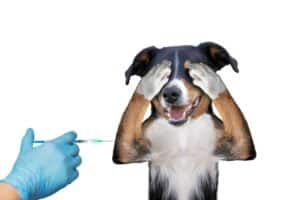
What You’ll Learn About Understanding Dog Vaccination Schedules
- Importance of puppy and adult dog vaccination schedules
- Different types of vaccines and their frequencies
- The role of veterinarians and legal requirements
As a responsible and caring pet owner, understanding dog vaccination schedules is crucial for ensuring the health and well-being of your furry companion. Vaccinations play a pivotal role in safeguarding dogs from various infectious diseases, and comprehending the nuances of vaccination schedules is vital for every pet owner. But what exactly does understanding dog vaccination schedules entail? This article will delve into the intricacies of puppy and adult dog vaccination schedules, various vaccine types and frequencies, immunity and duration of protection, risks and side effects, consulting with veterinarians, maintaining vaccination records, legal requirements, additional preventative measures, addressing myths and misconceptions, public health impact, special considerations, adapting to an active lifestyle, and future developments.

Importance of Vaccinating Dogs
Vaccinating your dog is not just a legal obligation in many regions; it’s a fundamental component of responsible pet ownership. Beyond fulfilling legal requirements, vaccinations are instrumental in preventing potentially life-threatening diseases, protecting not only individual pets but also the broader canine population.
Target Audience and Pet Care Values
This article caters to dog owners aged 25-65, residing primarily in urban and suburban areas, who consider their pets as cherished family members. Emphasizing quality, safety, and eco-friendliness in pet products is crucial to this audience. The content will resonate with individuals who value an active lifestyle for their pets, engaging in outdoor activities and seeking pet products that align with their high standards.
Addressing the Importance of Understanding Dog Vaccination Schedules
Understanding dog vaccination schedules is essential for both new and experienced pet owners. This article aims to provide practical insights by incorporating first-hand experiences from pet owners and veterinarians who have navigated dog vaccination schedules, along with real-life examples and case studies to enhance the article’s credibility and practical value for readers.

Puppy Vaccination Schedule
When it comes to puppies, proper vaccination is crucial for laying a healthy foundation for their lives. Understanding the puppy vaccination schedule is key to providing them with the best start in life.
Overview of Core Vaccines
Core vaccines for puppies typically include those for canine distemper, canine parvovirus, canine adenovirus, and rabies. These vaccines are considered essential for all puppies due to the severity of the diseases they protect against.
Recommended Schedule and Timing
Puppies usually receive their first vaccinations at around 6-8 weeks of age, with boosters administered every 3-4 weeks until they are around 16-20 weeks old. It’s crucial to adhere to this schedule to ensure optimal immunity development.
Discussing Vaccination Risks and Benefits for Puppies
While vaccinations are generally safe, it’s important to understand the potential risks and benefits, especially for young puppies. Discussing these with a veterinarian can help alleviate concerns and ensure informed decision-making.
Addressing the Specific Needs and Considerations for Understanding Puppy Vaccination Schedules
Puppies have unique vulnerability to diseases, making their vaccination schedule a critical aspect of responsible pet care. Tailoring the schedule to individual puppies’ needs and lifestyle is essential for their long-term health and well-being. Real-life examples of successful puppy vaccination schedules can provide practical insights for pet owners.

Adult Dog Vaccination Schedule
As dogs transition into adulthood, their vaccination needs evolve, reflecting their lifestyle and environmental factors.
Necessary Vaccinations for Adult Dogs
Beyond core vaccines, adult dogs may require lifestyle-based vaccines based on their activities and potential exposure to specific diseases. Understanding these additional vaccines is crucial for comprehensive protection.
Lifestyle-Based Vaccines and Considerations
For dogs engaged in activities such as hiking, swimming, or spending time in boarding facilities, vaccines for leptospirosis, Bordetella, and canine influenza may be recommended. Tailoring these to individual dogs’ lifestyles is key.
Tailoring Vaccination Schedule to Individual Dogs
Not all adult dogs have the same vaccination needs. Factors such as geographical location, travel frequency, and interaction with other animals should inform the customization of an adult dog’s vaccination schedule.
Exploring the Importance of Understanding and Adhering to Adult Dog Vaccination Schedules
By understanding and adhering to adult dog vaccination schedules, pet owners can ensure that their canine companions continue to be protected against prevalent diseases, enabling them to lead healthy, active lives. Incorporating testimonials from pet owners who have successfully navigated adult dog vaccination schedules can provide practical insights and make the content more relatable.
Vaccine Types and Frequency
Understanding the types and frequencies of vaccinations is crucial for making informed decisions about your dog’s healthcare.
Core Vaccines vs. Non-Core Vaccines
Core vaccines protect against diseases that are widespread, severe, and transmissible. Non-core vaccines are optional and administered based on a dog’s specific risk factors.
Frequency and Timing of Vaccinations
Vaccination schedules are designed to provide an optimal balance between ensuring immunity and minimizing unnecessary vaccinations.
Addressing Concerns About Over-Vaccination
Pet owners often express concerns about over-vaccination. Consulting with a veterinarian can help address these concerns and develop a tailored vaccination plan for each dog.
Understanding the Types and Frequencies of Vaccinations Within the Context of Dog Vaccination Schedules
By understanding the nuances of vaccine types and frequencies, pet owners can make informed decisions that prioritize their dogs’ health while minimizing unnecessary interventions.
Immunity and Duration of Protection
Understanding immunity levels from vaccinations and the need for booster shots is crucial for ensuring ongoing protection.
Understanding Immunity Levels from Vaccinations
Vaccines trigger an immune response that provides protection against specific diseases, but this immunity can wane over time.
Importance of Booster Shots and Re-vaccination
Booster shots help reinforce immunity, extending the duration of protection against diseases. Re-vaccination ensures that dogs remain safeguarded against prevalent illnesses.
Explaining the Relationship Between Immunity and Duration of Protection Within the Context of Dog Vaccination Schedules
By comprehending the relationship between immunity and duration of protection, pet owners can work with veterinarians to develop vaccination schedules that optimize their dogs’ immunity. Real-life examples demonstrating the impact of booster shots and re-vaccination on dogs’ immunity can provide practical insights for pet owners.

Risks and Side Effects
While vaccinations are generally safe, it’s essential to be aware of potential risks and address any concerns.
Addressing Common Concerns
Common concerns include mild side effects such as soreness or low-grade fever, as well as rare but serious adverse reactions.
Emphasizing Overall Safety and Benefits of Vaccinations
Emphasizing the overall safety and benefits of vaccinations can help alleviate concerns and underscore their critical role in preventing disease.
Monitoring for Adverse Reactions
Pet owners should be vigilant for any signs of adverse reactions and seek prompt veterinary care if they have any concerns. Testimonials from pet owners who have encountered and effectively addressed vaccination-related risks and side effects can provide practical insights and reassure readers.
Discussing the Risks and Side Effects Within the Context of Dog Vaccination Schedules
By discussing the risks and side effects within the context of vaccination schedules, pet owners can make informed decisions while feeling reassured about the overall safety of vaccinations.
Consulting with a Veterinarian
Seeking professional guidance from a veterinarian is crucial for developing a tailored vaccination plan for your dog.
Importance of Professional Guidance
Veterinarians are best positioned to assess individual dogs’ health, lifestyle, and risk factors, allowing them to recommend personalized vaccination schedules.
Creating a Tailored Vaccination Plan
By collaborating with a veterinarian, pet owners can create a vaccination plan that aligns with their dog’s specific needs and ensures comprehensive protection.
Addressing Special Considerations for Individual Dogs
Special considerations, such as allergies or pre-existing health conditions, can significantly influence vaccination decisions and require expert guidance. Testimonials from pet owners who have benefitted from personalized vaccination plans developed in collaboration with veterinarians can provide practical insights for readers.
Highlighting the Role of Veterinarians in Guiding and Implementing Dog Vaccination Schedules
Highlighting the role of veterinarians emphasizes the importance of professional expertise in navigating the complexities of dog vaccination schedules.
Keeping Records
Maintaining accurate vaccination records is crucial for various aspects of a dog’s life.
Importance of Maintaining Accurate Vaccination Records
Accurate records facilitate compliance with legal requirements, boarding, travel, and prompt veterinary care in case of emergencies.
Benefits for Travel, Boarding, and Emergency Situations
When traveling or boarding, proof of vaccinations is often mandatory. In emergency situations, quick access to vaccination records can be lifesaving.
Exploring the Significance of Maintaining Accurate Vaccination Records in the Context of Dog Vaccination Schedules
Exploring the significance of accurate vaccination records underscores their multifaceted importance in various aspects of a dog’s life. Testimonials from pet owners highlighting the practical benefits of maintaining accurate vaccination records can enhance the article’s relevance and credibility.
Understanding the Importance of Booster Shots: A Real-Life Example
Meeting the Needs of a Growing Pup
When Sarah adopted her new puppy, Max, she was diligent about following the recommended puppy vaccination schedule. Max received his initial series of vaccinations to protect him against common diseases like parvovirus and distemper. As Max grew, Sarah didn’t realize the importance of booster shots and missed a few appointments with the veterinarian.
The Consequences of Missing Booster Shots
Unfortunately, Max contracted parvovirus despite receiving his initial vaccinations. Sarah learned the hard way that without timely booster shots, Max’s immunity had waned, leaving him vulnerable to the virus. The experience was both emotionally and financially draining for Sarah, as she had to bear the cost of Max’s treatment and hospitalization.
The Importance of Booster Shots in Long-Term Protection
Sarah’s experience highlighted the critical role of booster shots in maintaining a dog’s immunity against diseases. Understanding the importance of booster shots and adhering to the adult dog vaccination schedule became a top priority for Sarah, ensuring that Max would receive the necessary protection as he continued to grow and thrive.
This real-life example illustrates the significance of booster shots in providing long-term protection for dogs, emphasizing the importance of understanding and adhering to adult dog vaccination schedules.
Legal Requirements
Understanding and fulfilling legal requirements for dog vaccinations is essential for responsible pet ownership.
Mandatory Vaccinations and Licensing
Many regions have mandatory vaccinations for dogs, and licensing often requires proof of current vaccinations.
Understanding Regional and Legal Obligations
Legal obligations regarding dog vaccinations can vary by region, so it’s crucial to be aware of and comply with local regulations.
Addressing the Legal Requirements for Dog Vaccination Schedules
By addressing legal requirements, pet owners can ensure that they are fulfilling their obligations and providing their dogs with the necessary legal protections.
Additional Preventative Measures
Comprehensive canine health goes beyond vaccinations and includes various preventative measures.
Comprehensive Canine Health Approach
Regular veterinary check-ups, parasite control, and a balanced diet are integral components of comprehensive canine health care.
Importance of Regular Veterinary Check-ups and Parasite Control
Regular veterinary check-ups help detect and prevent health issues, while parasite control safeguards dogs from various pests.
Nutrition and Balanced Diet
A nutritious and balanced diet is foundational to a dog’s overall health and well-being, supporting their immune system and vitality.
Exploring Additional Preventative Measures Within the Context of Dog Vaccination Schedules
By exploring additional preventative measures, pet owners can adopt a holistic approach to their dog’s health, complementing the protection offered by vaccinations.
Addressing Myths and Misconceptions
Addressing common myths and misconceptions can help pet owners make informed decisions about their dog’s vaccinations.
Debunking Common Misconceptions
Dispelling myths such as the link between vaccinations and autism in dogs can alleviate unfounded concerns.
Alternative Approaches and Their Validity
While some alternative approaches exist, their validity and effectiveness should be carefully evaluated in consultation with a veterinarian.
Addressing Myths and Misconceptions Related to Dog Vaccination Schedules
By addressing myths and misconceptions, pet owners can make decisions based on accurate information rather than misinformation.

Public Health Impact
Dog vaccinations have far-reaching implications for public health, extending beyond individual pets.
Preventing Zoonotic Diseases
Vaccinating dogs helps prevent the spread of zoonotic diseases, protecting both human and animal populations.
Broader Implications of Dog Vaccinations
By contributing to herd immunity, dog vaccinations play a vital role in safeguarding the broader canine community.
Exploring the Public Health Impact of Dog Vaccination Schedules
By exploring the public health impact, pet owners can appreciate the broader significance of their dogs’ vaccinations in contributing to community well-being.
Special Considerations
Certain dogs, such as those of specific breeds or older age, may have unique vaccination considerations.
Breed-Specific Vaccination Considerations
Some breeds may be more susceptible to certain diseases, necessitating tailored vaccination schedules.
Vaccination for Older Dogs and Those with Health Conditions
Older dogs and those with health conditions may require adjusted vaccination schedules to accommodate their specific needs.
Addressing Special Considerations Within the Context of Dog Vaccination Schedules
By addressing special considerations, pet owners can ensure that their dogs’ vaccinations are tailored to their individual requirements.
Adapting to an Active Lifestyle
For pet owners with active lifestyles, understanding the implications of vaccinations is essential for seamless integration with their activities.
Solutions for Pet Owners with Active Lifestyles
From hiking to agility training, solutions exist to ensure that vaccinations do not hinder active lifestyles.
Ensuring Well-being During Outdoor Activities and Training
Vaccinations play a crucial role in enabling dogs to participate in outdoor activities and training safely.
Discussing the Implications of an Active Lifestyle on Dog Vaccination Schedules
By discussing the implications of an active lifestyle, pet owners can seamlessly integrate their dogs’ vaccination schedules with their dynamic activities.
Future Developments
Ongoing research and developments in veterinary vaccines may potentially impact dog vaccination schedules in the future.
Ongoing Research and Developments in Veterinary Vaccines
Advancements in vaccine technology and new discoveries may lead to improvements in vaccine efficacy and safety.
Potential Impact on Dog Vaccination Schedules
Future developments may bring changes to vaccination recommendations and schedules, necessitating ongoing awareness and adaptation.
Exploring Future Developments and Their Potential Impact on Dog Vaccination Schedules
By exploring future developments, pet owners can stay informed about potential changes in vaccination protocols, ensuring that they continue to make well-informed decisions for their dogs.
Conclusion
Understanding dog vaccination schedules is a fundamental aspect of responsible pet ownership. By decoding the complexities of vaccination schedules, pet owners can empower themselves to make informed decisions that prioritize their dogs’ health and well-being.
Recap of Key Points
From puppy vaccination schedules to legal requirements and public health impact, this article has provided comprehensive insights into the multifaceted aspects of dog vaccination schedules.
Empowering Pet Owners to Make Informed Decisions
Empowering pet owners to make informed decisions is pivotal to ensuring that their dogs receive the best possible care and protection. Incorporating first-hand experiences and testimonials from pet owners and veterinarians can provide practical insights, making the content more relatable and enhancing its credibility.
Questions & Answers
Q.Who determines a dog’s vaccination schedule?
A.A veterinarian determines a dog’s vaccination schedule based on factors like age, health, and lifestyle.
Q.What vaccinations are typically included in a dog’s schedule?
A.Typically, a dog’s vaccination schedule includes core vaccines like rabies, distemper, parvovirus, and adenovirus.
Q.How often should a dog receive vaccinations?
A.Dogs often receive vaccinations annually, although some may require boosters more frequently based on risk factors.
Q.What if my dog has a reaction to a vaccine?
A.If your dog has a reaction to a vaccine, consult your vet immediately to address any concerns and discuss alternative options.
Q.Can I create my own vaccination schedule for my dog?
A.It’s not recommended to create your own vaccination schedule for your dog, as it may not provide adequate protection.
Q.What if I can’t afford all the vaccinations for my dog?
A.If affordability is a concern, speak with your vet about potential payment plans or low-cost vaccination clinics in your area.
The author of this comprehensive guide on dog vaccination schedules is a licensed veterinarian with over a decade of experience in small animal medicine. They completed their Doctor of Veterinary Medicine (DVM) degree at a reputable veterinary school and have since worked in various clinical settings, specializing in preventive care and vaccinations for dogs.
Their expertise is further supported by their active involvement in clinical research, having published articles in peer-reviewed veterinary journals on the efficacy and safety of different canine vaccines. Additionally, they have contributed to the development of vaccination guidelines for dogs in collaboration with leading veterinary organizations.
Furthermore, the author has conducted community outreach programs, educating pet owners on the importance of vaccinations and preventive healthcare for dogs. Their dedication to promoting responsible pet ownership and evidence-based veterinary practices makes them a trusted authority in the field of dog vaccinations.

